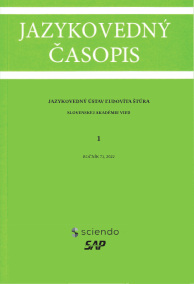Občianska rétorika a sociálna inklúzia
Civic rhetoric and social inclusion
Author(s): Alena BohunickáSubject(s): Language and Literature Studies, Theoretical Linguistics, Pragmatics, Rhetoric
Published by: Jazykovedný ústav Ľudovíta Štúra Slovenskej akadémie vied
Keywords: civic rhetoric; deliberative rhetoric; vernacular rhetoric; collectivity; social inclusion; inclusive rhetoric;
Summary/Abstract: The subject of the study is current civic rhetoric with regard to the inclusive rhetorical mechanisms employed in it. In classical rhetoric, we rely on the Aristotle’s deliberative type of rhetoric. We are interested in the citizen’s predisposition for involvement in deliberation (deliberative competence including its rhetorical aspect), the identity of rhetorical deliberative subjects, as well as the rhetorical procedures and genres in civic rhetoric. We work on the assumption that inequality of deliberation actors is the impetus for the creation of inclusive rhetoric. In this paper we distinguish three functions of inclusive rhetoric: (1) coordination function (coordination of various individual or group interests, opinions, intentions), (2) compensatory function (compensating for knowledge, information and other deficits) and (3) solidarity function (strengthening collectivity as a prerequisite for the influence and success of proposals in the negotiation phase of civic rhetoric. These particular functions characterize inclusive rhetoric in the public debate phase of civic rhetoric (i.e., deliberation in its own sense). We characterize and illustrate them through the rhetorical speeches and deliberative practices of the founder of the civic initiative IG24.
Journal: Jazykovedný časopis
- Issue Year: 73/2022
- Issue No: 1
- Page Range: 51-64
- Page Count: 14
- Language: Slovak

